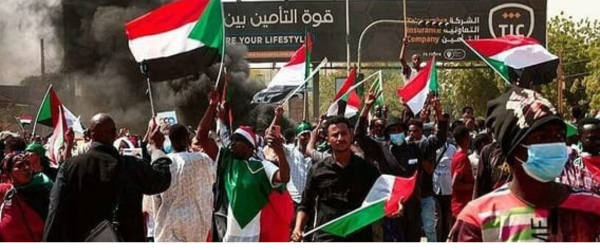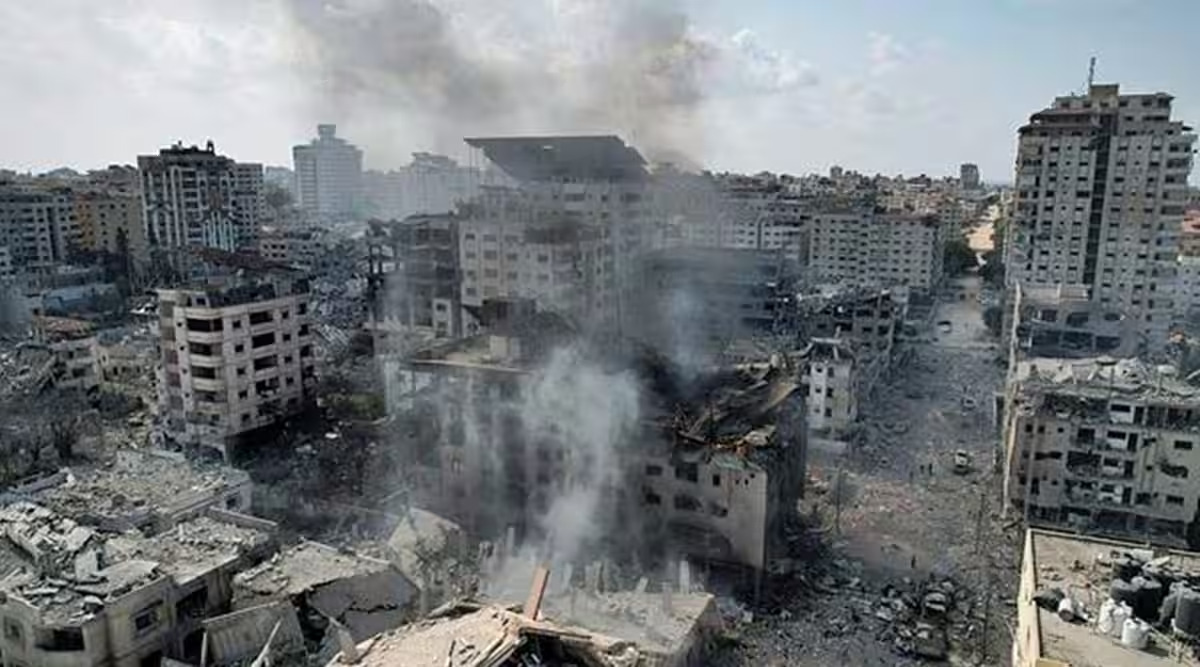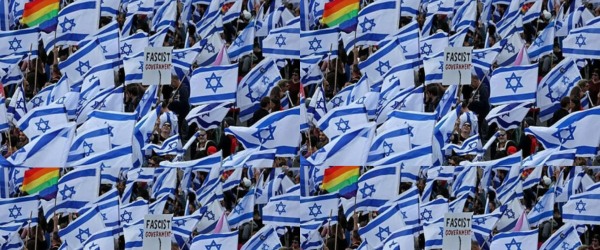Current Sudan Political Crisis And Its Impact On The Nation

Table of Contents
ToggleIntroduction
The current political crisis in Sudan shows that violence has become part of their history, which continues to trope the nation. We can see now also when violent clashes erupted on April 15 between two rival groups, the RSF (Rapid Military Forces), also known as ‘Janjaweed’ founded by Bashir, a paramilitary group led by General Mohammed Hamdan Dagalo also known as Hemedti, and the Sudanese army led by General Abdel-Fattah Burhan who is also a de facto ruler. Recent violence, precipitating on April 15, is due to a dispute about how RSF paramilitary forces should be integrated into the Sudanese army, and tensions flared when the RSF began deploying personnel throughout the country without official authorization from the military. As a result, the crisis had reached its fifth week when airstrikes were resumed on Friday over Khartoum and Bahri, its twin city, along with the long-awaited move by Army chief Abdel Fattah al-Burhan to remove its rival RSF Chief Dagalo from his position of Deputy of Sovereign Council which has led to an escalation of an already dire humanitarian situation for civilians who are confined and displaced.
Background
The major causes of the political crisis in Sudan built up over the years and have a cascading effect. As a nation, Sudan leads Africa in the number of coups it has experienced. There have been six coups since independence from the UK in 1956: in 1958, 1969, 1985, 1989, 2019 and 2021. The 1989 coup resulted in Bashir’s ascension to power, where he ruled as a dictator for three decades. During his tenure, the Sudanese civilians endured the customary abuses of authoritarian governance, including the presence of a secret police force, suppression of dissent, and corruption. The power struggle in Sudan can be traced back to the period before the 2019 uprising that led to the disposition of the authoritarian leader Omar al-Bashir. During his reign, Omar al-Bashir established powerful security forces and pitted them against each other, contributing to the ongoing power struggle. Following a coup in 2021, which terminated a transitional government established after the ousting of the longstanding dictator Omar-al Bashir two years ago, the military has been in charge of Sudan with General Abdel -Fattah Burhan, the coup leader serving as the de facto ruler and RSF leader Hemedti have also collaborated with the Sudanese army to maintain their hold on power. After the removal of Bashir, a political transition was initiated to hold elections by the end of 2023. Burhan pledged to facilitate a transition to civilian governance. Following this, armed clashes have ensued between the RSF and Sudanese Armed Forces in various regions of Sudan, including the capital city of Khartoum. The escalation of violence has occurred within three days.
The major fault lines that escalated the crisis were:
1. Incorporation of RSF into Sudanese armed forces
2. Another issue that is causing disagreement is the effort to achieve justice regarding charges of war crimes committed by military personnel and its allies during the Darfur conflict in 2003, along with the atrocities committed in Darfur during the 2019 protests where RSF launched a brutal attack on protestors killing 120 people.
3. There is growing concern over RSF’s attempts to gain control over more of the country’s economic assets, particularly its gold mines.
Situational Update
1. Before the current conflict, it was projected that approximately 15.8 million individuals, roughly 1/3 of the population, would require humanitarian assistance by 2023 due to climate crisis, ongoing conflict, and economic downturn. In 2023, approximately 4 million children under the age of five and pregnant or lactating women will suffer from acute malnutrition and require urgent nutrition services to save their lives.
2. According to World Bank reports, the floods in 2022 and 2023 significantly impacted over 900,000 individuals, resulting in the spread of cholera and malaria outbreaks.
3. As per the UN, the ongoing conflict has displaced more than 100,000 people from the country, while another 3,00,000 individuals have been internally displaced within the borders of Sudan.
4. According to the UN, just 16% of Khartoum’s health facilities are open, leaving millions without access to healthcare. In Khartoum, a facility that manufactured essential items for treating Sudan’s malnourished children was burned down.
5. There is ongoing mass looting and widespread destruction of community facilities such as water and communication systems, especially in Khartoum and Western Sudan. The aid response has been further impacted due to the looting of several humanitarian facilities, including 3 IOM (International Organization of Migration) offices/guesthouses and a warehouse which has disrupted supply chains, leading to a rise in food and gasoline prices.
6. The ongoing turmoil in Sudan is placing additional demands on host countries like Chad and South Sudan, which are already under significant strain due to food scarcity, climate change, and insecurity.
The conflicts in Khartoum and other parts of the nation are partly attributed to authoritarian rulers who command large military forces and dominate a significant portion of the country’s economy. These leaders have gained confidence by becoming essential participants in the political system.
The nationwide conflict between the two factions has rapidly extended from Darfur in the West to Gedaref in the east, Omdurman encompassing the capital city of Khartoum, which has become the epicenter of the fighting in contrast to previous conflicts which were fought in marginalized regions. Much of the combat is taking place in cities, with the army and RSF clashing over each other facilities and camps, which are often located close to residential areas. Friday’s airstrikes by both rival groups in Khartoum and Bahri have intensified the conflict, resulting in increased civilian casualties and the destruction of critical infrastructure.
On May 12, 2023 “Declaration of Commitment” was signed after a series of talks moderated by the USA and Saudi Arabia during the week, which will direct the actions of both forces to ensure the secure distribution of humanitarian aid, the reinstatement of vital services, the evacuation of troops from medical facilities, and the dignified burial of deceased individuals. But both parties returned to the field with the capital city bombarded by artillery fire and airstrikes.
The Geo-Political Angle
Sudan borders the Red Sea, Sahel, and the Horn of Africa, a volatile region. Regional power maneuvers have complicated the transition to civilian rule because of its strategic position and agricultural richness.
1.Many international actors are vying for dominance in Sudan, like energy-rich nations Saudi Arabia and the UAE, have also tried to influence events in Sudan, hoping to mitigate Islamist influence and stabilize the region.
2.Gulf governments have invested in Sudan’s Red Sea ports and agriculture, which has excellent potential.
3.Russia aims to establish a naval base in the Red Sea which formally came into the plan by signing an agreement with Sudan’s government in 2020. And its most significant strength is its mercenary group, Wagner, which has been supplying missile aid to RSF to fight against the Sudanese army and is involved in gold mining in the country, besides the fact that last decade China, Belarus, Ukraine, and Russia were the prominent suppliers of aircraft and armored vehicles to the Sudanese army, which was disrupted after the UN embargo in 2004.
4.Many UAE companies have signed preliminary agreements to develop ports and Khartoum-based low-cost carriers.
5.Egypt has significant military relations with Sudan and wants a similar type of administration in Khartoum also. Along with that, Burhan and Hemedti became close to Saudi Arabia after deploying soldiers in Yemen. Hemedti has also partnered with Russia and the UAE.
6.The “Quad,” formed by USA and Britain and the UN and African Union, sponsored Sudan mediation as the Russian base on the Red Sea dreaded Western powers.
SECURITY IMPLICATIONS IN SAHEL REGION
1. Increase in weapon circulation, especially small arms, which can proliferate across neighboring countries as borders are porous and armed groups are already in the region.
2. Fighting may intensify and destabilize the area, threatening Sudan’s ties with its neighbors like Chad and Ethiopia.
3. Humanitarian crisis could worsen across the region.
4. A potential civil war in Sudan may have regional spillover effects on neighboring countries already experiencing high levels of violence.
5. Over 60% of the Nile River Basin is in Sudan, so water management on the Nile is essential for regional stability.
BUSINESS IMPLICATIONS
1.Prolonged instability and conflict have severely affected Sudan’s economy, resulting in an inflation rate exceeding 600%. Certain regions are already experiencing famine. A protracted battle would impact Sudan’s exports of gold which earned them a total of ($2.85 billion) in 2021, crude oil ($385 million), groundnuts($488million), and sheep and goats ($239 million) as these products are sold mainly to the UAE, Saudi Arabia, India, China, and Italy.
2.In 2021, Sudan and South Sudan exported 132,000 barrels of crude oil per day in 2021, with the UAE taking 45% of it. Sudan exports more Arabic gum than any other country, an essential food ingredient in many industries whose product harvest has been hampered by the war.
3.Sudan imports raw sugar, refined petroleum, packaged medicines, wheat, and cars from China, Egypt, India, UAE, and Saudi Arabia. The ongoing conflict may impede trade and result in economic challenges for the country and its trade associates.
4.Sudan is situated on the Red Sea and current political instability may disrupt trade through Suez Canal, limiting these nations global trade capabilities. Port Sudan is also crucial stop for Muslim pilgrimages performing the Hajj to Mecca using Jeddah Islamic Port. Most Nigerian Hajj flights to Mecca pass through Sudanese airspace. Due to Sudan’s violent war, these carriers may have to take longer, more costly routes, which might prohibit many Muslims from fulfilling this vital religious ceremony.
5.Port Sudan is a vital container port that facilitates global trade, and 90% of Sudan’s foreign exchange goes through Port Sudan as it is a crucial commercial seaport for landlocked nations. The port’s interruption might exacerbate food storage.
6.Prolonged war could have adverse credit implications for neighboring countries and Multilateral development banks (MDBs) as they provide funding to African countries and their surrounding area.
Analysis
The ongoing conflict between the warring factions in Sudan has persisted for more than five weeks without any clear victory, indicating the possibility of a prolonged war between a proactive parliamentary group and a more well-equipped army. This could potentially destabilize the already fragile region. Despite the high number of casualties and the turning of Khartoum into a battleground, there has been minimal indication of reconciliation between the two rival groups. Ceasefire negotiations brokered by Saudi Arabia and the USA in Jeddah have not yielded any progress. During a recent Arab league meeting, Sudan’s representative made allegations against the RSF, accusing them of looting and rape and violating multiple ceasefires.
The 2021 coup highlighted the reluctance of influential individuals from the rival groups to permit democratization without safeguarding their authority and benefits derived from the current system.
They have consented to all ceasefires but failed to execute them. A potential catalyst for dialogue could be the imminent victory of one party. The attainment of a tactical advantage, such as the expulsion of the RSF from Khartoum, may present an actual window for dialogue.
Sources: Web articles from Reuters, The Conversation, Financial Express, Outlook, Aljazeera, The Economic Times, ORF, The Guardian, Middle East Eye, CNN World, Chatham House, and The Print.

MA International Studies
Christ University, Bangalore


